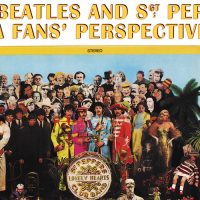What is “Beatleness”? Author Candy Leonard explores the term and what it means to be a Beatles fan in Beatleness: How the Beatles and Their Fans Remade the World, a book that examines the famed band from the “Fans-Eye View,” as the cover states. Interviewing numerous first-generation fans (those born between 1945 and 1961), Leonard illustrates how one rock group significantly impacted many listeners’ lives and, in turn, history.
Although the author studies Beatles fandom through a sociological lens, it is an accessible read and an often fascinating journey of how one generation has incorporated the Beatles’ music into their lives.
Leonard defines the term “beatleness” broadly, but it essentially covers three areas: the Beatles’ music and their personalities; emotional reactions to their music and image; and as she writes, “cultural references and artifacts, tangible and intangible, that evoke the Beatles.” She tells the group’s story, but mostly through fans’ eyes. Illustrated by quotes from interviewees, the book explores the group’s influence on gender roles, authority, cultural shifts, relationships, and morals. Anyone who wonders how listeners first reacted to songs like “Eleanor Rigby” and “Strawberry Fields Forever” will be intrigued; while some fans said they temporarily changed to more pop-oriented acts like the Monkees, others willingly accepted the challenging material and expanded their musical and cultural horizons. “The lyrics, the color palette of their voices … the feel of the music itself, all evoking and reflecting a wider range of human emotion. Brains light up at the richness and complexity. It’s neurologically pleasing. It’s Beatleness,” Leonard concludes.
In other words, Beatleness impacted aforementioned roles, issues, and overall culture.
Drawing on these interviews as well as philosophers such as Kenneth Burke, Leonard argues that pop music functions as educator in young lives. Through their music, the Beatles were encouraging teens to question accepted wisdom and “use their moral reasoning skills” with songs such as “Nowhere Man” and “Rain.” Most interesting is the assertion that these fans were not passive listeners; rather, they saw themselves as being on a journey. The Beatles presented new ideas and sounds that expanded their world view and urged them to consider other perspectives. To underscore this point, Leonard interweaves significant historical events such as the Vietnam War, the assassinations of Martin Luther King, Jr. and Robert F. Kennedy, Civil Rights, women’s equality, and the Stonewall riots. While none of these events can be traced directly to the Beatles, they are important for understanding the context of the times. “The more fans were ‘pushed beyond’ where they were, the more they let the Beatles in, the more intertwined they became in fans intellectual and emotional developments,” Leonard posits.
Beatleness does not shy away from controversial topics such as drug use. Did the Beatles encourage young listeners to experiment with pot and acid? While some interviewees admitted to trying them, others did not follow suit. Some lives were ruined by drugs, Leonard admits, but other people viewed drug experimentation as simply part of late adolescence. Leonard does not accuse the Beatles of spreading drug use, however. She states that they were open about trying LSD, but generally did not actively encourage others to emulate their choices.
One important aspect of the book is puncturing one myth about Beatles fandom: that people wanted the Beatles to remain “mop tops” through their entire careers. According to men and women interviewed for this project, they enjoyed watching the four men change in image and sound. “Watching and learning from their evolution was a key part of what made growing up with them so enriching and nurturing,” Leonard summarizes.
By examining the Beatles through their fans, Beatleness fills a knowledge gap in the band’s vast history. Instead of viewing screaming girls with amusement, Leonard digs deeper to discover the reasons behind fans’ continuing devotion to the group. Unlike many other bands, the book illustrates, the Beatles even influenced future career choices and continues playing a significant role even as Baby Boomers approach retirement. First generation fans will appreciate this look back at a particular time in music history, while subsequent generations will enjoy learning why the band still plays a significant part in music and general history.
- The Rescued Early Paul McCartney Song That Completed ‘Beatles For Sale’ - December 4, 2024
- A Rare Beatles Cover Proves John Lennon Was Wrong About His Voice - November 26, 2024
- How John Lennon Came Roaring Back on the Beatles’ White Album - November 22, 2023


